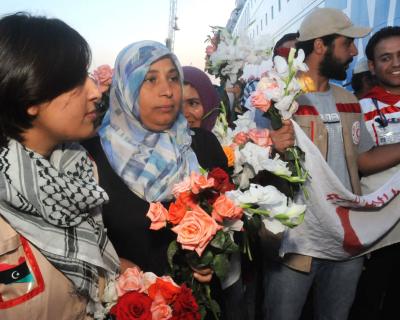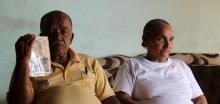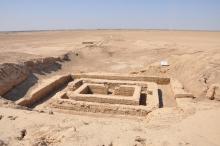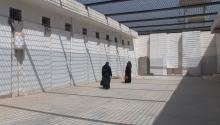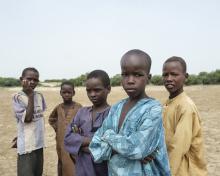Basic international humanitarian law (IHL) rules applicable to this situation:
The parties to the conflict must allow and facilitate rapid and unimpeded passage of humanitarian relief for all civilians in need, without distinction, subject to their right of control.
The parties to the conflict must ensure that authorized humanitarian relief personnel have the freedom of movement they need to carry out their work.
Whenever possible, and particularly after an engagement, each party to the conflict must, without delay, take all possible measures to search for, collect and evacuate the wounded, sick and shipwrecked without adverse distinction.
The wounded, sick and shipwrecked must receive, to the fullest extent practicable and with the least possible delay, the medical care and attention required by their condition. No distinction may be made among them founded on any grounds other than medical ones.
The case in brief
In 2011, the North Atlantic Treaty Organization (NATO) led a military campaign against the Libyan armed forces. Among the NATO members, Türkiye did not actively participate in the fighting conducted under the NATO operation, which had a United Nations mandate to protect civilians under attack in Libya.
Fierce fighting in the besieged coastal cities of Misrata and Benghazi resulted in many wounded and a lack of properly functioning medical facilities. In coordination with the conflict parties, the Turkish government deployed a hospital ship to evacuate the seriously wounded to Türkiye and arranged their treatment at Turkish hospitals.
IHL compliance highlights
- Recognizing the plight of injured people trapped in the besieged cities, the Turkish government deployed a hospital ship to Libya equipped with a 15-strong medical team and adequate supplies to ensure the evacuation and treatment of the wounded.
- In consultation with the Libyan parties to the conflict, the Turkish government secured a 12-hour ceasefire to ensure the ship could dock in safety. Twelve Turkish fighter jets and a frigate provided military cover to secure the ship’s passage to and from Türkiye.
- As agreed, the Libyan parties allowed the Turkish ship to evacuate hundreds of wounded people from Misrata and Benghazi.
- The on-board medical team provided emergency treatment and, on the ship’s arrival in Türkiye, Turkish authorities and humanitarian organizations promptly transferred the wounded to hospital for appropriate care.
Case prepared by Alexandra Bernard and Dewi Alexandra Delf, LL.M. students at Leiden University, under the supervision of Professor Robert Heinsch as well as Alla Ershova (Senior Researcher) and Ashley Peltier (Researcher), Kalshoven-Gieskes Forum, Leiden University.
A. TÜRKIYE TAKES PART IN THE OPERATION UNIFIED PROTECTOR MANDATED TO PROTECT CIVILIANS IN LIBYA
[Source: NATO, ‘Operation UNIFIED PROTECTOR Protection of Civilians and Civilian-Populated Areas & Enforcement of the No-Fly Zone’, October 2011, available at https://www.nato.int/nato_static_fl2014/assets/pdf/pdf_2011_10/20111005_111005-factsheet_protection_civ.pdf, accessed on 31 January 2021]
[...] Mission: On 31 March 2011, NATO took overall command of international military operations over Libya. The aim of NATO’s actions is to protect civilians and civilian-populated areas from attack or the threat of attack.
[...]
Mandate: Operation Unified Protector is mandated under Chapter Seven of the UN Charter. UN Security Council Resolutions 1970, 1973 and 2009 relate to NATO’s mission. UNSCR 1973 mandates “all necessary measures” to protect civilians and civilian-population areas under attack or threat of attack in Libya.
[...]
Participating Nations: As at 26 September, sixteen countries (Belgium, Canada, Denmark, France, Greece, Italy, Jordan, Netherlands, Norway, Qatar, Spain, Sweden, Turkey, United Arab Emirates, United Kingdom and United States) have provided air assets and flown sorties in support to the operation. This effort is complemented by NATO-owned AWACS surveillance and reconnaissance planes.
[...]
B. TÜRKIYE EVACUATES AND TREATS THE WOUNDED IN LIBYA
[Source: Government of Turkey, ‘Press Release Regarding the Ankara Ferry Docked at the Misurata Port for Humanitarian Assistance,’ 3 April 2011, available at https://reliefweb.int/report/libya/press-release-regarding-ankara-ferry-docked-misurata-port-humanitarian-assistance, accessed on 31 January 2021]
Turkey, which gives priority to the protection of civilians, the establishment of an immediate ceasefire and the unimpeded and effective conduct of humanitarian aid efforts within the context of recent developments in Libya, continues its humanitarian assistance activities at the national level with a view to alleviating the grievances of the Libyan people, while it also provides active contribution to the international efforts carried out to this end under the auspices of the UN and NATO.
Most recently, upon the instructions of our Prime Minister, we have sent to the region the M/F Ankara Ferry, which was transformed into a hospital ship, in order to transport to Turkey the wounded people in Misurata, a city exposed to intense clashes, for their medical treatment. This endeavor has been put into implementation through high-level close coordination and cooperation conducted by our Government among our related institutions, in particular the Turkish General Staff, the Disaster and Emergency Management Presidency of the Prime Ministry, our Ministry and the Ministry of Health.
With a view to ensuring that the Ankara Ferry accomplishes its mission without any impediment, intense consultations and coordination efforts with the parties in Libya have been held by the Minister of Foreign Affairs himself and through our diplomatic representations in Libya.
[...]
230 wounded people and 60 attendants were taken on board the ferry and the ferry left Misurata for Benghazi late last night. The ferry which is expected to arrive in Benghazi at around 17.00 hours local time today will also take the wounded people in Benghazi who are in need of urgent medical care and will then leave for Turkey.
[...]
The Ankara Ferry will dock at the Çeşme Port and all necessary measures for the rapid transport of the wounded people to the hospitals in the region have been taken in coordination with the Ministry of Health and the Turkish Red Crescent.
Turkey will continue and increase its humanitarian assistance activities to heal the wounds and alleviate the sufferings of our Libyan brothers who are undergoing hard times.
[Source: The National News, ‘Turkey sends ship to rescue 230 wounded from Libya,’ 5 April 2011, available at: https://www.thenationalnews.com/world/europe/turkey-sends-ship-to-rescue-230-wounded-from-libya-1.428969, accessed on 31 January 2021]
[...] The Ankara, a car ferry that was turned into a hospital ship, complete with a 15-member medical team on board and several tons of medical supplies, docked in Misrata on Saturday, according to the ministry. Twelve Turkish F-16 fighter jets and a frigate provided military cover. Members of Turkey's special police were on board the Ankara for further protection, but did not leave the ship in Misrata, according to Turkish diplomatic sources.
"Intense consultations and coordination efforts with the parties in Libya" made sure there was no fighting in the harbour area of Misrata during the stay of the Ankara, the foreign ministry said. Turkey secured a 12-hour ceasefire in the city to protect the "breath-taking operation", the Sabah newspaper reported.
[...]
[Source: ICRC, Annual Report 2011, May 2012, pp. 318-320, available at https://reliefweb.int/sites/reliefweb.int/files/resources/icrc-annual-report-2011.pdf, accessed on 31 January 2021]
[…] The Turkish authorities mounted a large-scale humanitarian operation in response to the crisis in Libya, repatriating thousands of Turkish nationals who were working there and evacuating more than 500 weapon-wounded Libyans by sea and air to Turkey. Most of the wounded were repatriated after receiving treatment in Turkish hospitals.
[…]
Weapon-wounded Libyans evacuated to Turkish hospitals received visits from ICRC delegates; some of them took the opportunity to send news to their families back home.
[...]
WOUNDED AND SICK
Of the first 12 Libyan weapon-wounded patients evacuated by the Turkish NGO Humanitarian Relief Foundation (IHH) to two Istanbul hospitals, 11 were visited by an Ankara-based ICRC delegate in late March and again in early April. At their request, they received Arabic-Turkish dictionaries. Some took the opportunity to exchange news with their families back home through the ICRC.
To help boost medical providers’ capacities to respond to emergencies resulting in weapon wounds, 78 medical faculties, the Turkish Surgery Association and other relevant stakeholders received 350 print and 300 CD copies of the Turkish-language version of the ICRC’s war-surgery manual.
[...]
Visits to Libyan weapon-wounded patients in Turkish hospitals (see Wounded and sick) provided an opportunity for the leadership of the IHH and the ICRC to develop dialogue on issues of mutual interest.
[...]
RED CROSS AND RED CRESCENT MOVEMENT
The Turkish Red Crescent played an active role in providing humanitarian relief to victims of the armed conflicts in Libya and Somalia.
[...]
C. TÜRKIYE'S CLOSE TIES WITH LIBYA
[Source: Republic of Turkey Ministry of Foreign Affairs, ‘Speech Delivered by H.E. Prime Minister Recep Tayyip Erdoğan on Libya,’ 7 April 2011, available at http://www.mfa.gov.tr/speech-delievered-by-h_e_-prime-minister-recep-tayyip-erdogan-on-libya-_ankara_-7-april-2011_.en.mfa, accessed on 31 January 2021]
[…] First of all, I need to express the deep concern and sorrow with which we are following the pain and plight that our Libyan brothers have to endure during these hard times.
As I have underlined on so many occasions, the Turkish and Libyan peoples are tied to each other with strong bonds of brotherhood, in addition to the fact that our countries share a common history and culture.
In light of the recent developments in Libya, Turkey has reacted from the outset in the most sensitive way and has viewed the situation through a humanitarian perspective as well as within the context of bonds of brotherhood.
Just as Turkey has never remained indifferent to any problems in her region and in the world, she has not turned a blind eye to the hardship of her brothers and tried to display the responsible attitude that befits her.
[…]
I want to underline this once more: While doing this, we carry no hidden agenda. Our sole agenda is to guarantee the unity and well-being of Libya.
For us, a drop of a Libyan blood is more valuable than billion Dollars-worth of oil wells. Wherever they may be in Libya, the life and right of each and every one of our Libyan brothers are above all considerations of interest; this is the way it should be.
[...]
Our people will always stand by the brotherly Libyan people and will work together with our Libyan brothers for the future of Libya.
[…]
Discussion
I. Classification of the Situation and Applicable Law
1. How would you classify the situation in Libya in 2011? What additional information would you require to make such a determination? (GC I-IV, Art. 2, Art. 3, P I, Art. 1; P II, Art. 1)
2. Which rules apply to the Turkish armed forces during Operation Unified Protector? (GC I-IV, Art. 2, Art. 3; GC I Art. 15; GC IV, Art. 16; CIHL Rules 109, 110)
II. Evacuation and Treatment of the Wounded
3. How does IHL protect the wounded and sick? Are the wounded and sick afforded similar protections in international and non-international armed conflicts? Do the obligations of the parties to the conflict differ depending on the conflict classification? (GC I-IV Art. 3; GC IV, Art. 16; P I, Art. 10; P II, Art. 7, Art. 8; CIHL, Rules 109, 110)
4. (Document B, Source 3) Are parties to an armed conflict obliged to allow humanitarian organisations access to the wounded and sick? Are the obligations the same in international and non-international armed conflicts? Do such visits provide parties to the conflict and the humanitarian organisations an opportunity to further dialogue? (P I, Arts. 70, 71; CIHL Rules 55, 56)
5. Does IHL allow parties to prioritise the evacuation and treatment of certain wounded persons based on different grounds, for example nationality, or is such distinction prohibited under IHL? (CIHL, Rule 110)
III. Elements Contributing to Respect for IHL
6. (Document A) UN Security Council Resolution 1973 authorises States to take all necessary measures ‘to protect civilians and civilian populated areas under threat of attack’. How do you think external pressure from the international community contributed to respect for IHL?
7. (Document C;) Do you think the close relationship between Libya and Türkiye influenced compliance of Türkiye with IHL? In your opinion, could other factors influence Türkiye’s decision to evacuate the wounded?

